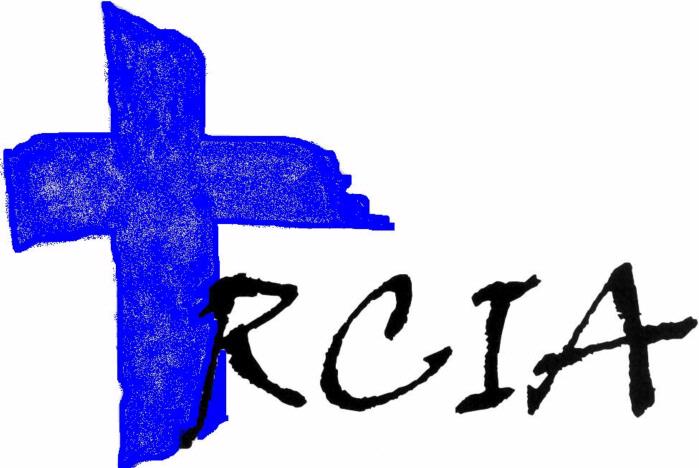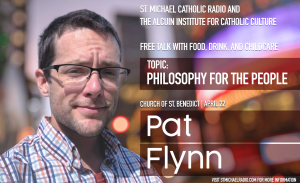A Journey through RCIA –

Christian Morality: Virtues, Sin, and Grace
Virtues
In today’s modern culture, virtue is seen more as a weakness or as something to be mocked. Television, movies, music, books et. al. seem to be most popular when they are promoting immorality. As a Christian, in the so-called “Buckle of the Bible Belt” I can be very concerned with what I see, even in the area that I live in. Oklahoma City was recently on national news for being the site of a attempted Black Mass where satan worshippers wanted to use a consecrated Host for their evil ceremony. Reading all these things, I felt it was necessary to start this post with a definition of virtue from the RCIA paperwork.
A virtue is a habitual and firm disposition to do the good. It allows the person not only to perform good acts, but to give the best of themselves. The goal of a virtuous life is to become like Christ.
Some may read that paragraph and scoff. I on the other hand find it to be a refreshing reminder of our goal as followers of Christ. It’s important to understand that while we are not perfect and while we are all inclined to sin, we can still have goodness as a goal.
Libraries have been filled with how the Church views what it means to live a virtuous life, and there are many resources for finding them. Rather than attempt to re-create them haphazardly in short-form, I will simply list their major categories and where they can be found in the Catechism or the NAB at the end. My hope is that if you are reading this, you have already begun your journey and that you are likely familiar with these; but if you are not, please do yourself a favor and go by a Catholic church and inquire about learning more. If that is too much for now; which it would have been for me when I started; listen to Catholic Answers Live, they answer nearly every question in a clear respectful manner. (heard on St. Michael radio) You can also go to The Coming Home Network forums online and read posts from others who are seeking out information about the Catholic faith and ask any question you want, I have found they are a caring and thoughtful group who never shy from honest inquiry.
Sin
Sin has long been a topic that I wrestle with. It is one of the primary reasons I find it hard to accept God’s love for me. Like many, I have a softer conscience when it comes to “doing bad”. In school, I would have been the first to feel guilty if the teacher said “someone has done something wrong”. Even when I had done nothing wrong, I felt as though there was something I missed, or something I didn’t know was wrong but had acted badly anyway. My sensitivity to doing wrong does not mean I do not or have not sinned. On more occasions than I’d like to freely admit, I have sinned.
Coming from a non-Catholic background, I was raised to think that all sin was the exact same. So, the person who lied to spare a friend’s feelings was committing the same kind of sin as a murderer. Because of this, I think it motivated many of my behaviors. If I’m being honest, I never quite agreed with that logic. It seemed that kind of a God would not be the loving, kind, grace-giving God that I’d come to know. I always thought that if a person under human law was given a lesser sentence for a traffic violation than grand-theft auto then how could Jesus, who was tortured and died for human salvation, then condemn a person to hell for a small infraction of the law in the same way as a person who defiantly and openly cursed Him and His laws.
The Catholic tradition of separating sins into venial and mortal sins seems more in line with how I think a loving God would judge misdeeds. That does not mean that sin is not sin, or that it does not harm the relationship between God and man or that somehow the Catholic church does not discourage all sin. A venial sin, which still does damage the bond between man and God, does not rise to the same level and will not damn a soul. A mortal sin, according to the Catechism of the Catholic Church must have three components: the object of the act must be a grave matter, it must be committed with full knowledge, and it must be done with deliberate consent.
As a priest I heard recently said, if you say an sin mortal; you are saying the action is so bad that God will condemn them to an eternity in hell with no hope of salvation if they die without seeking forgiveness. He gave an example of someone being forced to kill another person because if they did not their own family would be killed instead. He said this would be a situation where a person’s consent was not given and that their free will was compromised by the threat to their family and hence would not rise to the level of a mortal sin. He continued to say that there are many sins that while they may be embarrassing do not rise to the level of offense to be called mortal.
Grace
Grace is one of those topics that I always thought Catholics didn’t believe in. A year before I started RCIA, I truly thought that all Catholics simply felt that if they did the kneeling, praying, confessing stuff each week that they were “in” so to speak. I honestly believed it when I heard many, many pastors from other Christian faiths say Catholics are trying to earn their salvation. Now, I feel very foolish for thinking such a arrogant and hurtful thought. I felt so bad about this thought pattern that I had to ask forgiveness of those in my life whom I know I offended because they were either former Catholics who later returned or those who never left but had lapsed in their practices. The truth that I have come to learn is that Catholics not only believe in grace, but absolutely depend on it, even more so than other faiths I have known. A definition of grace in a recent hand-out says grace is: the free and undeserved favor or help from God that enables us to respond to his call and become children of God and partakers of the divine nature. For me, that sums it up beautifully, and before my journey started in earnest, I never would believe a Catholic paper would contain those words. The Catechism has a entire section on graces CCC 2012-2016 that again are loaded with the wisdom I have come to expect from the Church.
The grace of the Holy Spirit confers upon us the righteousness of God. Uniting us by faith and Baptism to the Passion and Resurrection of Christ, the Spirit makes us sharers in his life. – ccc 2017
If you are at all curious as to how Catholics can call themselves Christians, the afore mentioned paragraph from the Catechism should say it all. This faith truly believes in grace given freely by God to man for the redemption of his soul. As I continue to learn more about the Church and all there is to offer I am convinced more and more that this is what Christ intended and that I must be here if I mean that I am a follower of Christ. I truly hope hearing about my own journey helps you in some way with your own.
– A Brother in Christ

